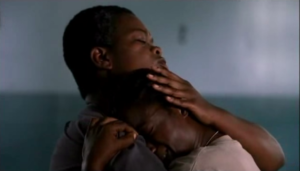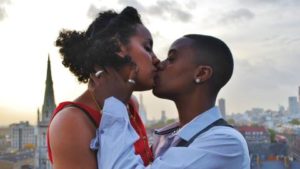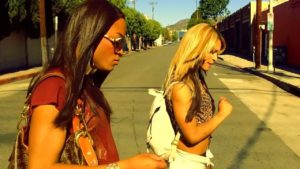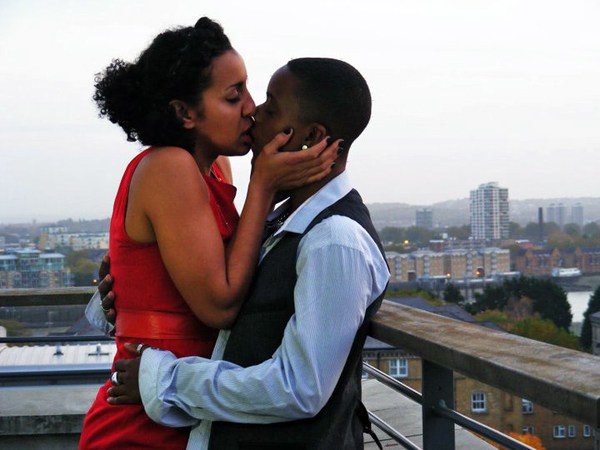Black Queer Youth
This year will be remembered in history for the pandemic, but the Black Lives Matter movement is also momentous, propelling us to reconsider ethnicity after decades of fighting for equality by BAME groups and their white allies.
Through the summer, I continued to research a book project on queer media work, prompted by a fascination with how queer cultural producers negotiate with the mainstream industries, the casting for LGBTQ+ characters on screen (see Martin Jr., 2018), and performance labour. While the last few years have seen some important crossover film successes, from Moonlight (2016), Call Me by Your Name (2017) to Bohemian Rhapsody (2018), black queer youth, except for young cis-gender gay men, are conspicuously absent. One of the films that I have considered a potential case study is the Kenyan drama Rafiki (Wanuri Kahiu, 2018), which was marketed as a pan-African queer experience to the global festival circuit. My research on Rafiki led to a review of research writings from feminist, queer and intersectional perspectives on the few films that depict the experiences of teenagers and young people of diverse gender and sexual identities.
In this playlist, I want to highlight the narratives that feature queer black youth as protagonists. The main characters in these films are lesbians, trans, genderqueer and non-binary. They range from teens to new and young adults. Together, these films ask questions about being young, about growing up black and queer. They assert the agency of young people rarely seen in films and television, let alone given the central roles to tell their stories.
These films offer some challenging reflections on race, gender and sexual identities, class and age. They contemplate friendship, family, hopes, dreams, and fears in a heady mix as the characters transition to adulthood:
The Color Purple (Steven Spielberg, 1985)
 Adapted from Alice Walker’s novel (see Jenkins, 2002), the epic coming-of-age drama features an African American girl named Celie (Whoopie Goldberg). Notwithstanding the sentimental plot, it is an early example of queer girlhood on screen and underpinned by Walker’s feminism. Available on Amazon Prime.
Adapted from Alice Walker’s novel (see Jenkins, 2002), the epic coming-of-age drama features an African American girl named Celie (Whoopie Goldberg). Notwithstanding the sentimental plot, it is an early example of queer girlhood on screen and underpinned by Walker’s feminism. Available on Amazon Prime.
Stranger Inside (Cheryl Dunye, 2001)

An uneven HBO TV movie from the director of The Watermelon Woman (Dunye, 2015). It follows a young prisoner who reunites with her mother in a correctional facility. The harsh reality and the search for the maternal figure can be heartbreaking at times. This is available on YouTube.
Pariah (Dee Rees, 2011)

A Brooklyn teen negotiates her growing sexual awareness. This is the film that defines black queer girlhood. Nancy Kang (2016) draws a parallel ‘lesbian steganography’ between the film and Audre Lorde’s classic Zami: A New Spelling of My Name (1982), both so evocative and powerful that they reduce me to tears (see also Keeling, 2015 and Pritchard, 2017). Available on Amazon Prime.
Stud Life (Campbell X, 2012)

The trans filmmaker Campbell X’s East London-set debut film offers a refreshing portrayal of love and friendship among gay and lesbian characters. It’s fun and urban, and the only British film I can find for this list, which is significant. Available on subscription on BFI and Amazon Prime.
Girlhood (Celine Sciamma, 2014)

Sciamma’s sensitive portrayal of the brutal passage of childhood is a paradox of hurting and friendship. It is a potent film that explores the explosive intersections of race, gender and class. Available to rent/buy on YouTube.
Tangerine (Sean Baker, 2015)

A daring film about two trans sex workers of colour in West Hollywood. The two leads, Mya Taylor and Kiki Kitana Rodriguez, provided the storyline but were uncredited, while critical acclaim was given to Baker. The film has evoked critiques from the trans community (see for example Collado, 2015). For me, the prevailing theme of the film is the difficult but tender relationship between the two central characters, which are sensitively portrayed by the first-time actors. Available on Prime Video.
Saturday Church (Damon Cardasis, 2017)

Teenager Ulysses is bullied at school and battles with their conservative aunt at home for being genderqueer. The Saturday Church is a community centre where Ulysses finds support from a group of trans and queer people. This fantastical musical should be more widely seen. Available on Prime Video and Netflix.
Rafiki (Wanuri Kahiu, 2018)

The budding love between two teenage girls in Nairobi is challenged by their families and entangled in the local political life. This was the first Kenyan film to be screened in Un Certain Regard at Cannes. The film is screening on Film4 now.
Most of the films on this list, albeit it is a relatively brief one, question the dominant and the normative, asserting the subject positions of young queer people. Significantly, there was precious little such representation until filmmakers such as Cheryl Dunye and Campbell X came along and began to make films about their own specific experiences. The imbalance of power between those who tell stories about LGBTQ+ folk—mostly cis-gender male producers and directors—and those being represented has engendered many controversies. The ways some of these films are produced have caused concerns among audiences from gender and sexual minorities, though there is also appreciation from others in the same communities. The persistent male gaze in the production of Tangerine (see above), the adaptations of Blue is the Warmest Colour (Abdellatif Kechiche, 2013) and The Handmaiden (Park Chan-wook, 2017) (see Shin, 2018) has attracted critiques from queer and feminist perspectives.
The films on this list are powerful and honest, and they resonate with me as a scholar of colour. Alongside the playlist, I hope the accompanying short reading list also highlights relevant critical texts from other scholars and writers of colour:
Collado, M. 2015. A Trans Woman of Color Responds to the Trauma of “Tangerine”. Autostraddle. 26 August 2015.
Dunye, C. 2015. Above the Line. WSQ: Women’s Studies Quarterly. 43(3/4):277-281.
Jenkins, CM. 2002. Queering Black Patriarchy: The Salvific Wish and Masculine Possibility in Alice Walker’s “The Color Purple”. Modern Fiction Studies. 48(4): 969-1000.
Kang, N. 2016. Audre’s Daughter: Black Lesbian Steganography in Dee Rees’ Pariah and Audre Lorde’s Zami: A New Spelling of My Name. Journal of Lesbian Studies. 20(2):266-297.
Keeling, K., DeClue, J., Welbon, Y., Stewart, J., Rastegar, R. (2015). Pariah and Black Independent Cinema Today: A Roundtable Discussion. GLQ: A Journal of Lesbian and Gay Studies. 21(2-3):423-439.
Martin Jr., AL. 2018. The Queer Business of Casting Gay Characters on US Television. Communication Culture & Critique 11(2): 282-297.
Pritchard, ED. 2017. Black Girls Queer (Re)Dress: Fashion as Literary Performance in Pariah. QED: A Journal in GLBTQ Worldmaking. 4(3):127-155.
Shin, CY. 2018. In Another Time and Space: The Handmaiden as an Adaptation. Journal of Japanese and Korean Cinema. 11(1):1-13. https://www.tandfonline.com/doi/full/10.1080/17564905.2018.1520781
***
Dr Wing-Fai Leung is Lecturer in Culture, Media, and Creative Industries at Kings College London where Fai researches the media, cultural and creative industries, in particular, issues related to work and labour. Her publications include two monographs: Digital Entrepreneurship, Gender and Intersectionality: An East Asian Perspective (2018) and Multimedia Stardom in Hong Kong: Image, Performance and Identity (2014).
Fai is currently undertaking two research projects: New British East Asian cinema: accent, gender and the city; Non-normative gender and sexual identities in the mainstream media culture.
